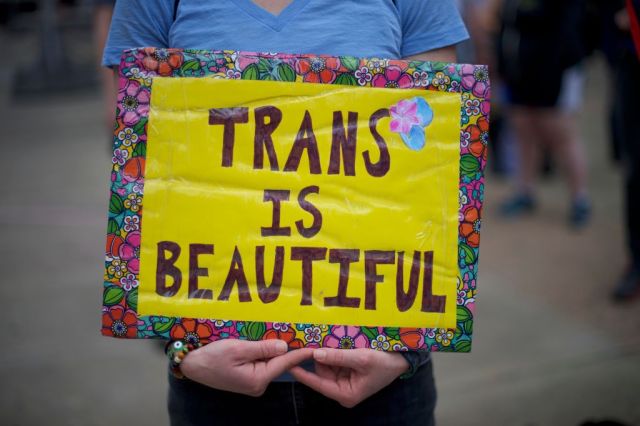Credit: Mark Makela/Getty Images

“It is acceptable for adolescent children to make their own decisions about their gender identity.”
Whether people agree or disagree with that statement opens a window onto one of the issues that politics doesn’t talk about enough, yet which matters a great deal.
The politics of transgenderism are under-explored for several reasons. Politicians’ timidity in the face of activists’ ferocity is one big factor. But there’s another, revealed in today’s UnHerd Britain data — that it’s a fiendishly complex issue that doesn’t fit easily into the narratives and categories that structure so much of British political debate. Or at least, political debate at Westminster.
Even a quick glance at the results at the UnHerd Britain results shows how enthusiasm for, and scepticism about, teenagers being able to change their gender at will are not distributed along conventional party lines.
Yes, the places where there is greatest support for that opening statement lean to Labour: Bethnal Green and Bow, Islington South and Finsbury, Jeremy Corbyn’s Islington North. Here, well over half the respondents are happy for children to “self-identify” as male, female or something else. Fewer than one in five people express any doubts.
But look at the other end of the spectrum and you’ll find that some of the places where people are most sceptical are also solid Labour. In Doncaster North and Wansbeck in Northumberland, well over a third of people are not persuaded that children should choose their gender.
Tory seats split in a similar way. Chelsea and Fulham and the Cities of London and Westminster are near the top of the “agree” list, yet true blue places such as Buckingham and South West Surrey are among the most sceptical.
This probably helps to explain why neither party has found the trans issue a comfortable one to accommodate. Even though both Labour and Tory leaderships (at least, Theresa May’s) have in recent years enthusiastically embraced calls for self-ID, both parties have also faced significant internal resistance.
Among the most organised sceptics of trans orthodoxy have been women from the trade union movement, traditional left-wingers who set up the Woman’s Place UK campaign. They have been surprised to find themselves fighting on the same side as social conservatives; Tory David TC Davies has become an unlikely hero to some lifelong left-wing feminists because of his willingness to air their concerns about this issue in Parliament.
What, if anything, unites the places that share similar perspectives of transgender issues?
A superficial analysis would conclude that this is just part of the “anywheres vs somewheres” debate that is en vogue in parts of Westminster. That’s the same story that dominates a lot of Brexit analysis, where Remainers are all urban sophisticates and Leavers all nativists in bleak post-industrial backwaters. Yet just as Phillip Cowley and Rob Ford brilliantly showed on these pages recently, a closer look at the transgender polling shows this issue can’t be neatly slotted into the “rich liberal cities — poor conservative towns” template either.
Yes, scepticism about that gender question is strong in some places that really have been “left behind” — Clacton in Essex and Boston and Skegness in Lincolnshire are, among other things, physically isolated, as much by dismal transport connections as by geography.
But what about Wolverhampton South West, barely 20 miles from Birmingham, and the Selly Oak seat where support for gender change is substantially higher? Wansbeck can not easily be written off as a north-eastern throwback. The seat is centred on the relatively affluent market town of Morpeth, home to better-off Newcastle commuters. (I went to the town’s comprehensive school; it was hardly Brideshead Revisited, but nor was it a Geordie version of Deliverance.)
Meanwhile, South West Surrey and Bracknell are safely inside the (large, affluent) London commuter belt. Bracknell is barely 40 miles from central London; the train takes little more than an hour. These are not the “left behind” towns of metropolitan media imagination, but they have significant doubts about a change in social mores that some people living just a few miles ago might consider unquestionable.
For the most enthusiastic supporters of transgenderism, there can be “no debate” — accepting the fluidity of self-defined gender is a given, something that posterity will judge was both inevitable and enlightened.
Yet it’s striking that in only in seven of all the constituencies did a majority (more than 50%) agree with that opening statement; everywhere else, the majority either questioned a staple of trans orthodoxy, or expressed no view. Some in the “Neither” column will be wary of expressing a view, but most will not yet have engaged with the issue in depth.
“No debate”? This poll shows that the debate about gender in 21st Century Britain is not just unresolved. It has yet to even begin in earnest.










Join the discussion
Join like minded readers that support our journalism by becoming a paid subscriber
To join the discussion in the comments, become a paid subscriber.
Join like minded readers that support our journalism, read unlimited articles and enjoy other subscriber-only benefits.
Subscribe